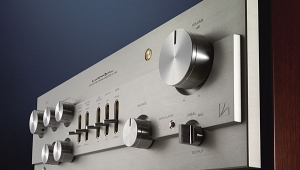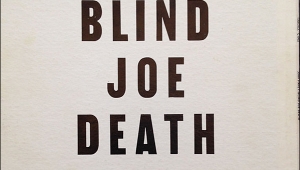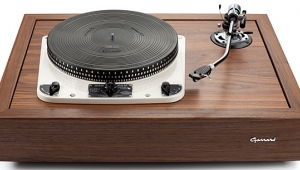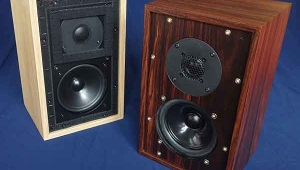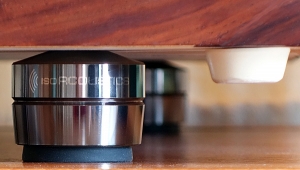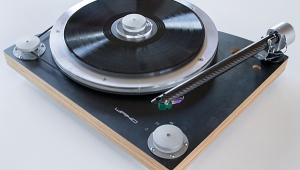| Columns Retired Columns & Blogs |
Listening #44
"Happy is he who gets to know the reasons for things."
—Virgil
Footnote 1: I also happen to think that claims of reputability are themselves more than enough cause for mistrust: When you meet someone who adorns himself with the crown of debunker—especially if he asks for a donation to help fund all of his noble and selfless debunking work—your first instinct should be to run the other way, preferably while hollering "Rape! " at the top of your lungs.
In February 2000, a physicist at Bell Labs announced that he had succeeded in creating molecular-scale transistors. Imagine!
The researcher in question, one Jan Hendrik Schön, produced hundreds of pages of graphs and other data that appeared to support his claim, some of which were submitted for publication in Science. Virtually overnight, as these things go, Science's readers hailed the work as a genuine breakthrough in the field of nanophysics.

But there was a problem: When fellow researchers noticed some peculiarities in Schön's data—among other things, graphs in three unrelated papers were identical to one another—Bell's parent company, Lucent Technologies, formed an investigatory panel, which discovered evidence of "manipulation and misrepresentation" in Schön's data. (An amusing aside: Nanophysicist Schön defended his lack of raw supportive data by claiming his computer lacked sufficient memory to store it.)
File that away.
Measure twice, listen once
As far as some audiophiles are concerned, if a reviewer wants to go public with the idea that a certain amplifier has a better-than-average way with musical flow, or that it excels at pulling solo voices and instruments away from a dense mix of other sounds—simply because publishing those sorts of observations is what we're paid to do—then we must also back our claims with graphic evidence. According to some—the same some, more often than not—we must also be prepared to "prove" our conclusions in a double-blind listening test.
The apparently simple reason: The written word can be soft, emotional, temperamental, impressionistic, unscientific, equivocal, evasive, purple, or downright dishonest. But because it depends on numbers instead of on the ambiguities of the written word, a graph is itself a harder and more honest thing. And because a double-blind test carries with it some patina of scientific validity, it too must be more reliable—certainly more so than the reviewer's own words, given our notorious propensity for lying out of our asses whenever we think we can get away with it.
Weak though it may be, the English language has succeeded in producing a word that describes the antiprose attitude with remarkably accuracy: delusional. Anyone who is consistently, automatically inclined to disbelieve the text portion of an audio review while just as automatically trusting the graphic content is fooling himself. (My man-o-centric grammar is deliberate: They may not be able to parallel-park very well, but none of the women I've met over the years has been given to this particular brand of silliness.) And anyone who has so little faith in human hearing that he feels the need to continually test it and doubt it and test it and poke it and re-test it, to an extent applied to none of the other senses, should probably not be dabbling in domestic audio in the first place. The very fact that I have to say such a thing is itself cause for much sorry head-shaking.
And the tendency of some laymen to elevate science to the level of a religion—one of the respectable ones, at that!—just plain baffles me, and can be attributed to nothing more or less than unusually high levels of insecurity. But just as some emotionally needy people want to believe that all clergy are pious, all soldiers are virtuous and brave, and all teachers are doing a really! great! job!, they also want to believe that anyone who wields such a hard, honest tool as a number or a graph is himself an honest man. But straight blades are sometimes wielded by crooked people, as so capably demonstrated by the aforementioned Mr. Schön (footnote 1).
I don't mind being grouped with the subjectivists, as long as I can sit close to the aisle and wave at the people filling the pews on the other side— they're subjectivists, too, although I think they'd rather be called something else. I don't mind going along with that, either, just as long as everyone remembers that audio objectivism as we know it has a soft center not unlike that of a Tootsie Roll Pop: Specifications, measurements, and even double-blind tests can be valid, rigorous, repeatable, and quantifiable—but the assumption that the measurements being focused on actually have anything to do with musical performance is itself as subjective as hell. In fact, you could probably make a better case for using the term objectivist to refer to people who judge equipment only by listening to it: That is, after all, what the stuff is designed for—isn't it?
But even though these terms too unwieldy to keep using for the remainder of this column—not to mention dry and needlessly divisive—let me suggest a set of alternatives. From now on, let's think of audio subjectivists as the fuzzies, and audio objectivists as the woodies: We do, after all, have to coexist in the same toy chest at the end of the day.
Woodies can be lovely, reasonable people, and many of the ones I've met over the years have impressed me with their deep, genuine love of good music. But the bad ones are really bad: pugnacious, tyrannical, and narrow-minded in a manner that goes well beyond the comparatively benign character flaws of even the most dilapidated fuzzy. I stand open to correction, but apart from a puerile and titanically unfunny piece published in an early issue of The Abso!ute Sound, which centered around characters named Julian Hearse and David Ramada Inn (Stop, you're killing me), I've seldom seen fuzzies show anywhere near the same interest in haranguing woodies as the other way around (footnote 2). In fact, whenever I see a debate between an average fuzzy and an especially rabid woody, I picture a dialog between Akbar and Jeff in one of Matt Groening's comic strips:
"Why did you buy that amplifier?"
"Because I auditioned it and I liked the way it sounds."
"Why did you audition it?"
"Because my favorite reviewer in Stereophile said it was great."
"He's an idiot. You're wrong to like that amp."
"No, I'm not at all wrong to like that amp, but you can go ahead and think whatever you want. I don't care."
"You don't understand: You're wrong to like that amp. And that reviewer you love so much said that measurements don't matter."
"That's not what he said. He said that he's not bothered by poor frequency-response measurements."
"That means he loves distortion. He's a distortion lover."
"Whatever. I don't care what you think. I'm sure that he doesn't care, either."
"He doesn't care what his readers think? Then Stereophile should fire him."
"Oh, shut up."
"That proves you're wrong: You have to resort to character assassination."
"That wasn't character assassination. But you're free to think it was. I really don't care."
"Your amp has tubes. It adds a ton of distortion to the signal. It's overpriced, so only rich idiots like you can afford it. You're wrong to like it."
"It doesn't bother me that you think so."
"You're not listening to me: I said you're wrong to like that amp! It's distorted. Stereophile gave it a good review only because the company spends a lot of money on advertising."
"That company doesn't advertise in Stereophile. They don't advertise in any of the magazines."
"That's because the magazines are all dying. The Internet is killing them, which is fine with me. Besides, Stereophile gave that amp a good review only because they like everything."
"Oh, go away..."
"See? More character assassination!"
"Sigh..."
Footnote 1: I also happen to think that claims of reputability are themselves more than enough cause for mistrust: When you meet someone who adorns himself with the crown of debunker—especially if he asks for a donation to help fund all of his noble and selfless debunking work—your first instinct should be to run the other way, preferably while hollering "Rape! " at the top of your lungs.
Footnote 2: This is similar to the differences I've noted between Stereophile readers of diametrically different political persuasions: The number of conservative readers who have written apoplectic notes canceling their subscriptions in response to things that "Dudley" has written has now swollen to seven; the number of liberal readers who have canceled subscriptions in reaction to overtly conservative remarks by other Stereophile writers stands at zero. Sigh...
- Log in or register to post comments

